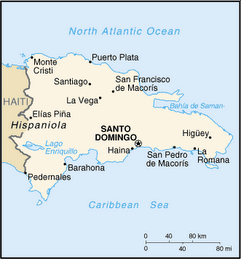Registering the Population
The OAS has begun developing a civil registry in Haiti that includes minors and children. The most basic elements of social and economic planning and development require a clear accounting of the population and their location. This process was started five years ago and more than 4 million adults had been registred when the earthquake hit on Jan 12. Efforts have been renewed since Jan. and some 1,500 children and their parents or guardians have been registered so far. (Caribbean News)
Relocating the Homeless
President Preval underscored the relocation of the homeless as a priority before the beginning of the hurricane season. But he has not found the magical formula to carry it out.
Relocating the homeless has become worrisome for the Haitian government and the international organizations intervening the the post-disaster activities. Many strategies have been studied, but none so far offers the desired effects.
People are being allowed back into their homes once they have been inspected. Some 40% of the homes in Port au Prince are still habitable. Some people who could be back in their homes refuse to return prefering to live in the camps where they can take advantage of receiving water, food and sanitary facilities.
7,000 homeless were forcefully removed from the soccer stadium. Another 245,000 are in danger of flooding during the rainy season. Seven tent sights have been declared high risk areas. Government officials make regular visits to these areas urging the people to consider moving. President Preval says that housing is his first priority. "Relocating 1.3 million people who sleep on the streets will take time and will be costly. We have started with those who faced the greatest danger. The reconstruction is going to take a long time". (Le Matin)
(The following is an article that explains a little about how the political system works in Haiti. It is a bit lengthy but I found it to be very instructive about insights into how the country is functioning).
Haiti and its flawed electoral process!
By Jean H Charles
The Haitian Constitution stipulates that regular presidential elections shall take place every five years on the last Sunday of November, with a presidential inauguration to take place on the following February 7, to correspond ab eternum to the day the Haitian people delivered themselves from the Duvalier dictatorial regime.
The earthquake of January 12, 2010, has destroyed the capital city of Port au Prince as well as surrounding cities of Jacmel, Leogane, Petit Goave and Grand Goave, with more than 1.7 million people sleeping under a tent, sometimes in the rain amidst squalor and the mud. Vital records have been destroyed, the dead have been cremated without proper state sponsored identification and the Preval government has exhibited a culture of deception, corruption, and perversion of the electoral process. It is a perfect storm to create a disaster in lives lost in the next few months. It is also the perfect tool for maintaining the status quo through a flawed electoral process. Yet the international community, through the voice of the OAS Assistant Secretary General Albert Ramdin, the United Nations representative Edmond Mulet, the CARICOM delegate PJ Patterson, is pushing full speed ahead for a flawed election to take place under the baton of Rene Preval, a master mind of cunning, double talk, and plain disregard for the plight of the majority of the Haitian people.
May 18 commemorates the weaving of the flag made with the blue and red piece of cloth from which the white piece symbolizing colonial France has been extirpated. On this very day of celebration, the people of Haiti are demonstrating en masse, on the street demanding the forced departure of the Preval government so they can go on with their lives, and ensure a fairly clean election. Will Preval and the international community, through misguided policy, succeed in maintaining a status quo that will lead to disaster in the coming months of the hurricane season with millions of people at risk? Or will the Haitian people succeed in forging a new order of business in running the Republic of Haiti?
Haiti has been sinking deeper into bigger risk in food security, diminution of human life protection and severe environmental degradation. The international community has responded with unusual humanity and compassion to the earthquake-stricken Haiti with ten billion dollars, the corrupt regime and the partisans of the status quo will easily sink $100 billion with no apparent result for the Haitian people. They have discovered a brand new concept: disaster profiteering.
Not one of the 565 rural hamlets of Haiti has received any funding for infrastructure and institution building. Seven million Haitian people out of the 9 million population live in extreme misery, neglect and ostracism from their own government.
May 28, 2010
Subscribe to:
Post Comments (Atom)






No comments:
Post a Comment